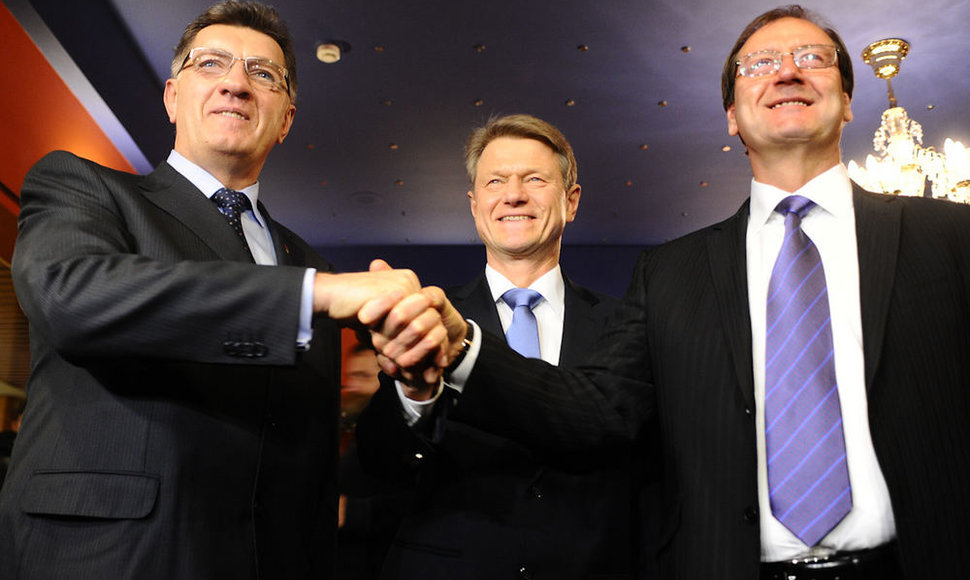Eight years ago, forming the Cabinet was a long and complicated process. The coalition, which consisted of the Social Democrats, the now defunct New Union (Social Liberals), the Peasants, and the Labour Party, did not last long and fell apart after Uspaskich's Labour Party slammed the door.
After this year's election, the ruling coalition seems clear: the Social Democrats have already shaken hands with the Labour Party and Order and Justice; they are also inviting the Poles to join. The general elections gave 38 seats to the Social Democrats, 29 to Labour, 11 to Rolandas Paksas-led Law and Order, and 8 to the Poles.
The balance of power was slightly different in 2004. The newly-established Labour Party triumphed with 39 mandates. The Social Democrats had 20 seats, the Social Liberals, 11 seats. Eleven more seats went to the Peasants and New Democracy Union, led by Kazimira Prunskienė.
Talks on dividing up power started right after the election night but they did not go smoothly. Even before the final results were announced, President Valdas Adamkus declared he could not conceive of Uspaskich heading Lithuania's 13th Government. The Labour leader retorted that the president was making a mistake and showing disrespect to voters.
However, it was the Social Democratic Party that claimed the post of prime minister (Brazauskas came to lead the Cabinet) as well as five ministers. The Labour Party took five ministries, the Social Liberals claimed two, the New Democracy Union, one.
Rows with the president
President Adamkus was suspicious of Labour candidates from the very start. He did not like the nomination of Viktoras Muntianas to the post of interior minister, so it was given to Gintaras Furmanavičius. The president also prevented millionaire Antanas Bosas from becoming a minister and the Labour Party from getting the strategically important Ministry of Communication.
The press reported how Social Liberal leader Artūras Paulauskas (he and his gang are now part of the Labour Party) went to President Adamkus and asked him to lower his standards in assessing Labour candidates. Otherwise, it was fared, the fragile ruling coalition – which had taken several weeks to negotiate – would collapse.
US diplomatic cables, disclosed by WikiLeaks, give a behind-the-scenes glimpse into what was happening in 2004.
According to US diplomats, Adamkus was very critical of 6 out of 13 candidates proposed for ministerial posts. He frowned upon Vladimiras Prudnikovas (Labour's candidate for minister of culture), Gintautas Bužinskas (minister of justice), but particularly Prunskienė (Peasants' minister of culture) and Uspaskich himself.
The cables reveal that the president even considered the option of rejecting the proposed Cabinet and Algirdas Brazauskas as prime minister.
He did not, however, and Uspaskich became the minister of economy – a post he held for less than one year and had to give up after the Chief Official Ethics Commission ruled that he had confused private and public interests in 2005. After the president declared no-confidence in Healthcare Minister Žilvinas Padaiga and Culture Minister Prudnikovas, the Labour Party withdrew from the ruling coalition and the Government in May 2006.
Blackmail and ultimatums
Lithuania's former president Adamkus describes his experience of 2004-2006 in his book “The Last Term. President's Diaries”. According to him, cooperation with the Labour Union caused many a headaches for Prime Minister Brazauskas, who had to put up with ultimatums and blackmail from Uspaskich.
Adamkus describes how, in December 2005, Labour politicians suggested that each ministry be given discretion to manage EU funds as they pleased. “I was convinced that the Finance Ministry should have centralized control. Brazauskas agreed with me completely and added that Uspaskich should not be given access to EU money at all. He allegedly needed to be politically isolated, since his questionable links to Moscow were evident,” Adamkus writes in his memoirs.
Another scandal broke out over privatization of the “Draugystė” hotel owned by Brazauskas' wife Kristina Brazauskienė. President Adamkus decided not to declare no-confidence in the prime minister. “The balance of power in the current Seimas (parliament) leaves me no room for manoeuvre. If Brazauskas were forced to resign, the Social Democrats would probably leave the ruling coalition. It would only be worse for the country, since Uspaskich and his party would take over,” Adamkus explains his reasons.
After the scandal subsided a little, Adamkus continues, Uspaskich came to Brazauskas with an ultimatum he could not accept.
“Uspaskich went completely overboard: he demanded that the prime minister post be given to his party (i.e., to himself) in addition to a few more ministries; moreover, he wants to set up a parliamentary commission to investigate the president's action and probably even to impeach me! I talked to Brazauskas yesterday evening. The prime minister confirmed that Uspaskich was making demands to the Government and threatened to leave the coalition, should his ultimatum be rejected. He also confirms that Uspaskich is meeting (Social Democratic politicians) Juozas Bernatonis and Gediminas Kirkilas. Brazauskas said he was not going to put up with the Labour Party's destructiveness,” reads Adamkus' diary entry from April 2006.
“I spoke to Brazauskas on the phone this morning. He told me that Kirkilas and Bernatonis spent until 4 AM talking to Uspaskich. He gave a final ultimatum: if Brazauskas' Government wanted to go on, Finance Minister Zigmas Balčytis had to go and so did Social Affairs Minister Vilija Blinkevičiūtė, Foreign Minister Antanas Valionis, and also Minister of Agriculture Kazimira Prunskienė (the Ministry of Finance and Ministry of Agriculture are the ones that distribute most of EU money!). Two of the vacated ministries had to be handed over to the Labour Party,” the president wrote the following day. He added that Brazauskas pledged not to succumb to blackmail.
At roughly the same time, Labour MPs undermined another coalition partner, Social Liberal leader Artūras Palauskas, who was forced out as the parliamentary speaker.
Adamkus describes a conversation with Paulauskas that took place a few days later: “Apparently, Uspaskich came to his (Paulauskas') office and said bluntly: You must abdicate. When Paulauskas gave a negative response, (Uspaskich) threatened: Everything was over anyway. It would only be worse to you. Very possibly, that even more things were said.”
Bielinis: No other choice for Social Democrats
According to political scientist Lauras Bielinis, the Social Democrats are forming a ruling coalition with the Labour Party again, despite their experience of eight years ago, because they have no other choice.
“If it isn't the Labour Party, cooperation with other parties presents even more complications. The present scenario – coalition with Labour, Law and Order, and the Poles – at least gives an opportunity of cooperation, and a rather constructive one at that, albeit no one knows how long it will last. The two parties are rather close ideologically and understand one another,” he says.
Bielinis adds that he is suspicious of any coalition devoid of internal tensions.
“When everything is too quiet, one wonders if this is indeed a coalition; if other parties are not simply arms of one party disguised under different names. There must be discussions, conflicts – as long as they are resolved in a civilized manner, through debate. We welcome problematic issues that do not have unanimous consent. And we hope that there will be a debate, since it is a precondition of a functioning parliamentary democracy,” he assures.













